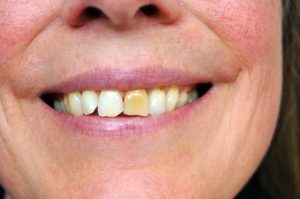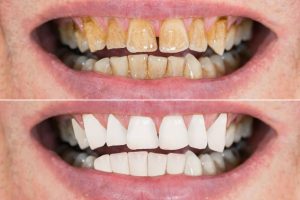Even if you regularly brush and floss your teeth properly, stains or spots may still appear on your teeth. Dark or black spots on teeth may really be an indication of something more severe, like teeth cavities, even if other forms of discoloration may not be dangerous, just causing an unwanted cosmetic impact.
Black stains on teeth are not always the result of tooth decay.
Continue reading if you are worried about how your smile may be affected by black spots on your teeth.
This article outlines the following:
- Why do I have black spots on my teeth?
- Black spots on teeth near the gum line
- How to get rid of black stains on your teeth?
We hope that this post will make it clearer how to get rid of black stains on teeth and how to avoid them in the future.
Also, read our post about cosmetic dentistry to learn more about your possibilities for a dental makeover.
In This Article
Black stains on teeth causes
Before going over the methods of how to get rid of black spots on your teeth, we will go over the possible causes.
Black stains on teeth may be caused by drinking alcohol, using cigarettes, and drinking coffee or tea. Dark or black spots on the teeth may also be brought on by poor dental care and tartar development. In addition, certain health conditions and treatments may also alter the color of your teeth.
Here are the most common causes of black stains or spots on teeth:

- Tartar: Plaque that hardens into a coating on the teeth and often develops below the gum line is known as tartar. Tartar can have a black color and may appear as little black spots on teeth near the gum line.
- Tooth restoration: Teeth may seem to be black in color as a result of amalgam fillings and crowns, especially those that contain silver sulfide.
- Cavities: Bacteria that attack tooth enamel and leave behind tiny holes are what create cavities. These holes may seem to be dark or appear as black spots on teeth.
- Certain medicines: For instance, taking liquid iron supplements may cause teeth to get stained. Black stains on teeth have also been connected to several antibiotics.
- Tobacco: Tobacco use, whether smoking or chewing, may seriously discolor teeth.
- Silver Diamine Fluoride: Silver diamine fluoride is a non-invasive cavity treatment that eliminates microorganisms and stops tooth decay in its tracks. It does, however, leave a dark stain where the tooth rot was. Adults seldom use this cavity treatment because of the potential for discoloration. However, sometimes it's advised for kids who have cavities on their baby teeth or kids with special needs who find it challenging to have a cavity treated.
- Fluorosis: Too much fluoride intake during the formative years of tooth development in children may lead to a disease known as fluorosis. It might happen as a consequence of taking fluoride-containing supplements, ingesting excessive amounts of toothpaste, or drinking fluoridated water. Fluorosis may result in tooth discoloration that shows up as white or black spots on the teeth.
- Natural aging: As people age, it's normal for their teeth to darken or to develop black or brown stains on their teeth. This may be triggered by the thinning enamel and the dentin becoming visible. The dentin has a darker color, which can be another reason for brown or black spots on teeth.
How to identify black spots on teeth
Spots on the teeth that seem brown or gray in hue may develop into black teeth over time. The spots might eventually become black. Sometimes, just below the gum line, a person will have what seem to be tiny black spots on their teeth.
The inside of the lower front teeth or the outside of the molars are frequent locations for black tartar on teeth. In spots where the tooth enamel has been eroded, black teeth may start to form holes.
To identify black teeth early, look for the following signs:
- Black spots on front teeth
- Black spots on teeth near the gum line
- Back spots on top of teeth
- Black stains on teeth near gums
How to prevent black stains on teeth

You may eliminate dietary or lifestyle-related black tooth stains by altering your behavior. If you chew or smoke tobacco, consider stopping and seeing how your teeth change. If you drink coffee often, consider rinsing your mouth with water after each cup or using a straw to avoid the coffee directly touching your teeth so much.
Examine your current oral hygiene regimen, since poor oral hygiene may also contribute to discolored teeth. Be careful to floss once daily, brush at least twice daily, and see the dentist every six months. Your dentist can find decayed areas and assist you in maintaining healthy, white teeth.
Finding the causes of black spots on teeth is crucial. By recognizing any of the aforementioned signs, you may stop black patches from becoming bigger and more noticeable.
However, even with the greatest at-home treatment, dark stains that have already set in on the teeth are typically very difficult to remove. Instead, you should seek immediate dental advice if you see black spots on your teeth.
How to get rid of black stains on teeth
As already mentioned, black stains or spots on teeth need to be treated by a dental specialist. Your teeth will be examined by a dentist, who will also identify the root causes of your black teeth and suggest solutions.
A dentist could use specialized instruments to attempt to remove the tartar if black tartar is the underlying issue. These include hand scalers that are made specifically to remove tartar and plaque from teeth. A dentist may occasionally need to employ specialized vibrating tools or ultrasonic devices to break up the tartar.

Unfortunately, there are situations when a dentist's tools are insufficient to remove black stains from teeth, for example, when dental decay is the underlying reason. A dentist may sometimes be able to fill the hole left by the decay after removing it.
You could need a crown if the dental decay has spread to the dentin, the inner substance that lies underneath the tooth enamel. When a tooth is decayed and has been cleansed of decaying debris, a dentist might cover it with a crown, which is a custom, tooth-shaped covering. This procedure is called a root canal.
Tooth-Colored, Composite Resin Fillings
If a cavity or other damage to your tooth caused the black spot on your tooth, it is important to get that condition addressed. The tooth discoloration is also remedied by treating the cavity.
The dentist initially drills and cleans the cavity, eradicating all traces of germs and tooth rot. The hole is subsequently filled with a composite resin filling in a shade chosen to complement the neighboring teeth.
Cosmetic treatments for black stains
If the discoloration is entirely aesthetic and does not endanger the health of your teeth, you have access to a number of cosmetic treatment alternatives for eradicating the problem, including:
- Teeth whitening kits for use at home
- Professional teeth whitening
- A dental prophylaxis or using an abrasive to clean teeth
- Dental bonding, veneers, or dental crowns may be used to conceal black spots on teeth
A dentist nearby may assist you in choosing the best cosmetic treatment option to address your tooth discoloration and enhance the look of your smile, depending on the kind of black spots on your teeth.
How to remove black spots from teeth at home
While a professional teeth whitening performed by a dentist will bring the best and quickest results, there are also some home remedies. Watch this video to learn how to remove black spots from teeth at home.
Conclusion
Once the source of your black stains has been treated, you may start cleaning your teeth and regaining your smile. The good news is that brown or black stains on your teeth's surface may be removed. Make an appointment with your dentist for a thorough cleaning beforehand.
To remove tartar and black stains from your teeth, your dental hygienist may use an ultrasonic cleaner and other dental hygiene tools. To whiten your teeth, you may also think about using whitening toothpaste that contains substances like hydrogen peroxide.
Just keep in mind that continuing the actions that led to your black stains will probably result in more stains in the future, so you should always deal with the root of the issue first.
Having black stains on your teeth might make you feel self-conscious, but they don't have to stay that way forever. You may get rid of stains and make your smile more vibrant by giving up your poor habits, establishing a strict dental hygiene regimen, and paying attention to your dentist's recommendations.
On the other hand, you may have the opposite problem — you can read more about white stains on teeth.
FAQs about black stains on teeth
What are the black spots on my teeth?
Black spots on teeth can have different causes. If your black spots are the result of tartar accumulation and/or cavities, the dentist will need to remove the decay and fill the cavity.

How to get rid of black stains on teeth?
It depends on the underlying issues and how bad the black spots are. To get rid of black spots on teeth, your dentist may need to remove decay and use a tooth-colored composite resin filling.
If the black spots are only on the outside of your teeth, a teeth-whitening kit may be enough.
Are black spots on teeth cavities?
Tooth decay, or a cavity, is likely the most frequent reason for a black spot on your teeth. Sometimes a black spot may appear where the tooth's enamel has been damaged.
Why do I have black spots on my teeth?
Brown or black spots on teeth can result from fluorosis, tartar, cavities, natural aging, silver diamine fluoride treatment, tooth restoration with amalgam fillings, or a poor oral health routine.
How to get rid of black spots on teeth?
Depending on the cause of the black spots on your teeth, you may try whitening products or consult your dentist for dental prophylaxis. Keep in mind to deal with the root causes of the black spots.
Pubmed.ncbi.nlm.nih.gov: Medication-related tooth discoloration: a review. Consulted 9th July 2022
Clevelandclinic.org: Tooth discoloration. Consulted 9th July 2022




